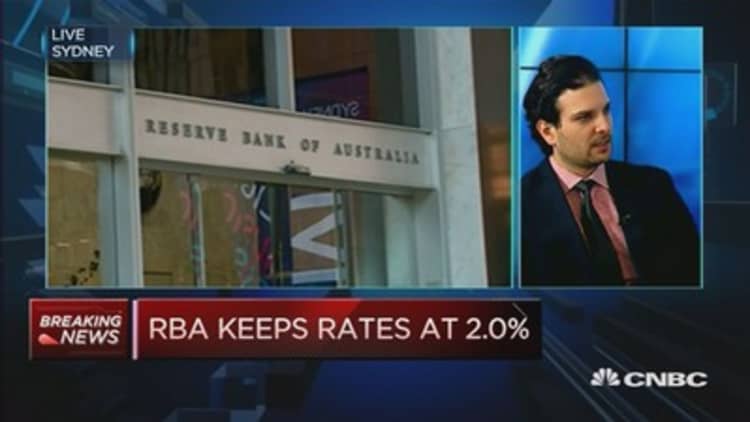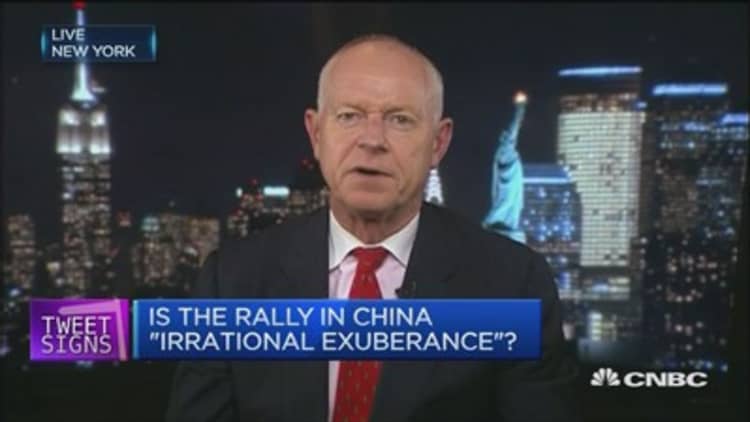As regional bourses stumbled on the back of a slew of central bank decisions, stocks markets in Shanghai shrugged off liquidity pressure to outperform with a surge of nearly 2 percent on Tuesday.
The Reserve Bank of Australia (RBA) held its cash rate steady at a record low of 2 percent, in line with analysts expectations, following two 25-basis-point rate cuts earlier this year.
Meanwhile, India's central bank lowered its key repo rate by 25 basis points to 7.25 percent, also in line with the expectations of majority of economists polled by Reuters. This is the Reserve Bank of India's (RBI) third rate cut of the year, after lowering interest rates by the same amount in January and March.
Read MoreWhy June could be a turning point for markets
Overnight, U.S. stocks ended with modest gains on the first trading day for June on the back of mixed second-quarter economic reports. The and the S&P 500 added 0.2 percent each, while the tech-heavy Nasdaq notched up 0.3 percent.
ASX slumps 1.7%
Australia's benchmark S&P ASX 200 index widened losses following the RBA's policy decision to eventually finish 2 percent lower, while the Australian dollar jumped as high as $0.7692 against the U.S. dollar, from around $0.7628 prior to the announcement.
It was a broad-based sell-off on Tuesday, with major lenders among the hardest-hit. Westpac and National Australia Bank receded 2.4 and 2 percent, respectively, while Commonwealth Bank of Australia and Australia and New Zealand Banking eased 1.8 and 1.3 percent, respectively.
Energy producers Santos and Oil Search tumbled 2.9 and 3.8 percent, respectively, on the back of weaker crude oil prices in Asian trade. Among miners, Fortescue Metals gave up early gains to finish flat, while bigger players BHP Billiton and Rio Tinto declined 3 and 1.6 percent, respectively.
On the domestic data front, the country's current account deficit widened to A$10.7 billion in the first quarter, slightly better than the expected deficit of A$10.8 billion. Meanwhile, net exports added 0.5 percentage points to the gross domestic product (GDP), beating forecasts of zero impact on growth, suggesting some upside risk for the GDP data due Wednesday.
Indian shares fall
The RBI's policy decision also did not sit well with Indian investors, with the benchmark S&P BSE Sensex index and the 50-share Nifty index widening losses to more than 1 percent each.
The Indian rupee weakened to as low as 63.81 against the greenback, from 63.70 prior to the policy announcement.

Mainland markets mixed
Tuesday witnessed volatile swings for China's index, which closed up 1.72 percent after nursing modest losses earlier in the day. Technology and small-cap stocks led the advance on the main bourse, while the ChiNext Index surged 4.9 percent to close at record highs for the second straight day.
The bourse had initially come under liquidity pressure sparked by a slew of initial public offerings (IPOs), including nuclear giant China National Nuclear Power Co. which started taking IPO subscriptions today. However, optimism over continued policy support and that Chinese equities were not in bubble territory eventually propelled the index upwards.
"Tellingly, the People's Bank of China (PBoC) did not address the soaring stock prices in its 2015 financial stability report, only saying that it will continue to promote a stable and healthy equity market. One can reasonably interpret the PBOC's reticence on the bull market as a quiet confidence that Chinese shares are not in a bubble," Bernard Aw, IG's market strategist, said in a note released on Tuesday.
China Everbright Bank was among the most actively-traded shares following news that it has secured regulatory approval to issue domestic preference shares in a private placement.
Read MoreChinese ferry with 458 aboard sinks in storm
Meanwhile, Hong Kong's index sagged nearly half a percent.
Among losers, L'Occitane International dropped 0.86 percent despite reporting a 35 percent jump in 2014 profit. Macau-related gaming plays succumbed to selling pressure even though the city's gross gaming revenue fell 37.1 percent in May from a year ago, better than the 38.5 percent decline expected. Galaxy Entertainment and Sands China erased early gains to retreat nearly 2 percent each, while SJM Holdings eased 1.6 percent.
British lender HSBC shed 0.4 percent on news that it is planning to cut thousands of jobs globally, according to a report by Sky News.
Meanwhile, China's fourth-biggest listed brokerage Huatai Securities recovered from Monday's unimpressive trading debut to bounce up 1 percent.

Nikkei slips 0.1%
Japan's benchmark Nikkei 225 index finished in the red for the first time in 12 sessions, as the dollar-yen retreated to 124.60 from a 13-year high of 125.03 attained earlier in the session. The Tokyo bourse eked out marginal gains of 0.2 percent from the get-go on Tuesday, but headed south in the afternoon session as a stronger yen sapped risk appetite.
Export-oriented stocks mostly lost ground in tandem with the currency moves; Honda Motor led losses in the automobile sector with a slump of 1.4 percent, while other blue-chips such as Canon and Sony closed down 1 and 0.4 percent, respectively.
Shares of Takata Corp. — the airbag manufacturer caught at the center of a global recall — finished 0.3 percent lower after it said on Monday that it will continue producing air bags that use ammonium nitrate propellant, but will change the design of the air bag inflators.
However, gains in selected stocks helped to limit the bourse's decline. NTT Docomo jumped 3.94 percent after the Nikkei business daily reported that the company plans a double-digit return on equity by fiscal 2017, while Chubu Electric Power topped the leaderboard with an electrifying 4.5 percent jump.
Read MoreJapan pension system hacked, personal data leaked
Kospi eases 1.1%
South Korea's Kospi index extended Monday's losses to settle at a four-week low. The Seoul bourse shed 0.59 percent in the previous session after being stung by slowing export data and lingering worries over Greece's debt issues.
Hyundai Motor and Hyundai Mobis closed down 10.4 and 8.5 percent, respectively, while Kia Motors tanked 4.1 percent on the back of monthly data that showed the country's auto sales shrank 4.2 percent in May from a year ago period.
Tourism-related plays also suffered steep losses after the health ministry confirmed on Tuesday two deaths related to the outbreak of Middle East Respiratory Syndrome (MERS) in South Korea. Traders were worried that the outbreak could hurt the country's tourism numbers.
As a result, Hanatour Service Inc tumbled 7.7 percent, while Hotel Shilla and Lotte Shopping threw away more than 3 percent each.

